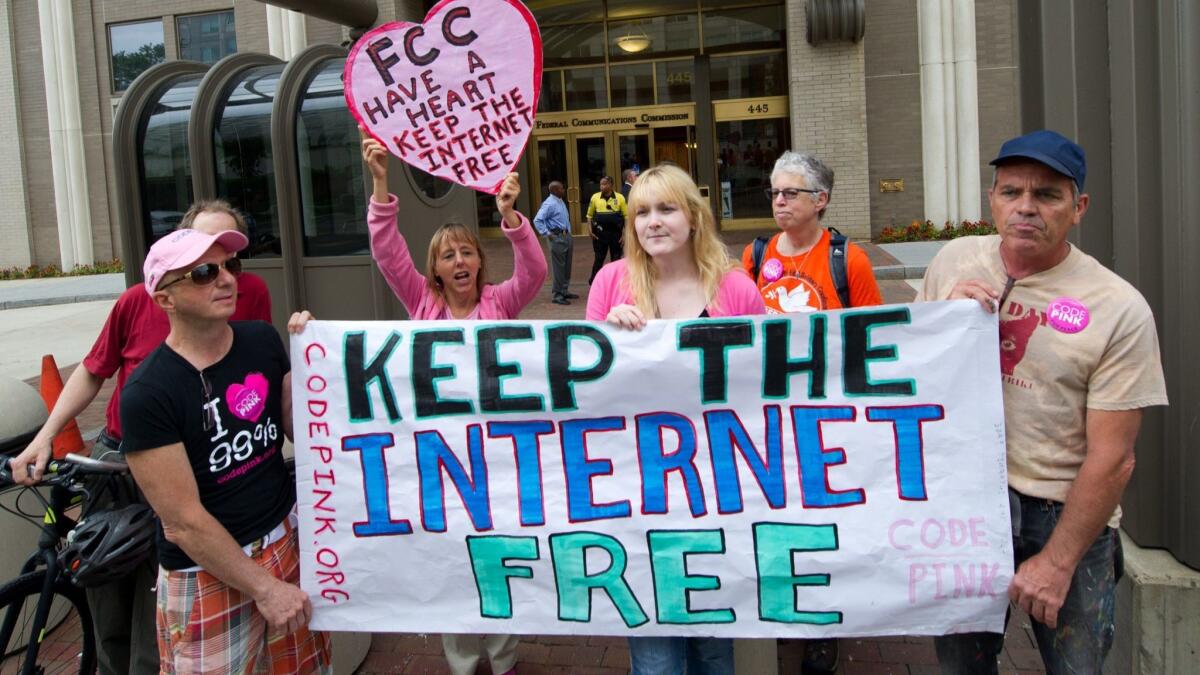Op-Ed: Hollywood needs a free and open Internet. So why isn’t it fighting for it?

The major entertainment companies are putting a lot of money into luring cord cutters — millennials and others who want to ditch their cable companies — to new subscription streaming services that allow viewers to watch their favorite TV shows and movies directly over the Internet. The same industry that once blamed the Internet for stealing content now wants to use it to sell directly to consumers.
CBS All Access service is one example. Others are Amazon Prime, Netflix, Hulu, MLB (Major League Baseball), HBO Now and Showtime. Fandango, the movie ticket-selling service, even waded into streaming a year ago with Fandango Now. According to one estimate, the streaming market — known as OTT, for “over the top” — will be worth $30 billion in four years, up from $10.7 billion in 2016.
It’s too bad that the Trump administration’s Federal Communications Commission is pursuing policies that could seriously harm these innovative efforts, just as the streaming business is getting going. And it’s really too bad that some in the media industry aren’t taking the threats seriously enough.
The assault will come in the form of telecommunications regulation. Trump’s newly appointed FCC chairman, Ajit Pai, has made it clear he wants to eliminate rules that establish net neutrality.
Net neutrality is probably the worst name for one of the best policies enacted during Obama’s administration.
Net neutrality is probably the worst name for one of the best policies enacted during Obama’s administration. A better name might be the Equal Opportunity Internet. It basically means that every company offering services online has to have the same chance to serve the consumer in the same way, and that the companies that move data around on the Internet can’t play favorites with one or another of those companies. Pai, a former Verizon lawyer, follows the Republican line that net neutrality must be abolished because it’s created by regulation and regulation is a bad thing.
To better understand what’s at stake, consider two of the streaming services I mentioned earlier, CBS All Access and Fandango Now. The one big difference between them is their ownership; Fandango Now is owned by NBCUniversal, which is in turn owned by Comcast, the biggest provider of high-speed Internet access in the country.
Under net neutrality rules, Comcast’s delivery systems can’t favor one streaming service over the other, even though it has a stake in one of them. Without that equal opportunity, Comcast could, for example, allow Fandango Now to perform better for consumers, with better data speeds, than CBS All Access. The resulting poorer picture quality would make the CBS service less desirable.
Pai, who first joined the FCC as a commissioner in 2012, made his anti-regulation position clear in a 67-page dissent issued in 2015 when the FCC approved its net neutrality rules. He blasted the rules as “an unlawful power grab” that favored “government control” over the Internet. Since President Trump appointed him commission chairman, Pai has issued a constant stream of statements and made a host of speeches restating his opposition to net neutrality.
While the grand plan for doing away with equal opportunity and fairness still remains a mystery, Pai has started nibbling at the edges. He moved quickly to suspend FCC rules governing consumer privacy online (the Republican Senate voted to repeal those rules entirely on Thursday), widely seen as a first attack on all Obama-era Internet regulations. He also ended a commission net neutrality investigation into wireless companies that allow customers access, without data caps, to some — but not all — streaming services on their mobile phones.
The entertainment industry should be fighting back against Pai’s predilection to undo the Equal Opportunity Internet, but it’s surprisingly oblivious. It doesn’t seem to recognize the threat he represents.
Netflix CEO Reed Hastings, once a strong supporter of net neutrality, was quoted on the tech website the Verge as saying he wasn’t worried. Even if “the formal framework gets weakened,” Hastings said, “we don’t see a big risk actualizing, because consumers know they’re entitled to getting all of the web services.” He added, “The culture around net neutrality is very strong. The expectations of consumers are very strong.”
Those expectations won’t be enough. The big telecom and cable companies have more than enough money, lawyers and clout: If the rules are loosened and they can favor the services that are in their pocket, they’ll exploit that advantage and fight to keep it for as long as it takes.
In the past, technology companies and public interest groups pushed hard for net neutrality. Now it’s time for reinforcements. In late February, CBS CEO Les Moonves was over the moon about his All Access service. If he wants to protect his investment in the streaming-only series “The Good Fight,” or the new “Star Trek” series slated for CBS All Access later this year, he had better start paying attention to the world of Internet traffic. He and his colleagues at established entertainment companies need to protect the open Equal Opportunity Internet. If they don’t, they will lose, and so will we.
Art Brodsky is a consultant in Washington. He covered the FCC as a journalist, and is the former head of communications for Public Knowledge, a consumer advocacy group.
Follow the Opinion section on Twitter @latimesopinionand Facebook
More to Read
A cure for the common opinion
Get thought-provoking perspectives with our weekly newsletter.
You may occasionally receive promotional content from the Los Angeles Times.










